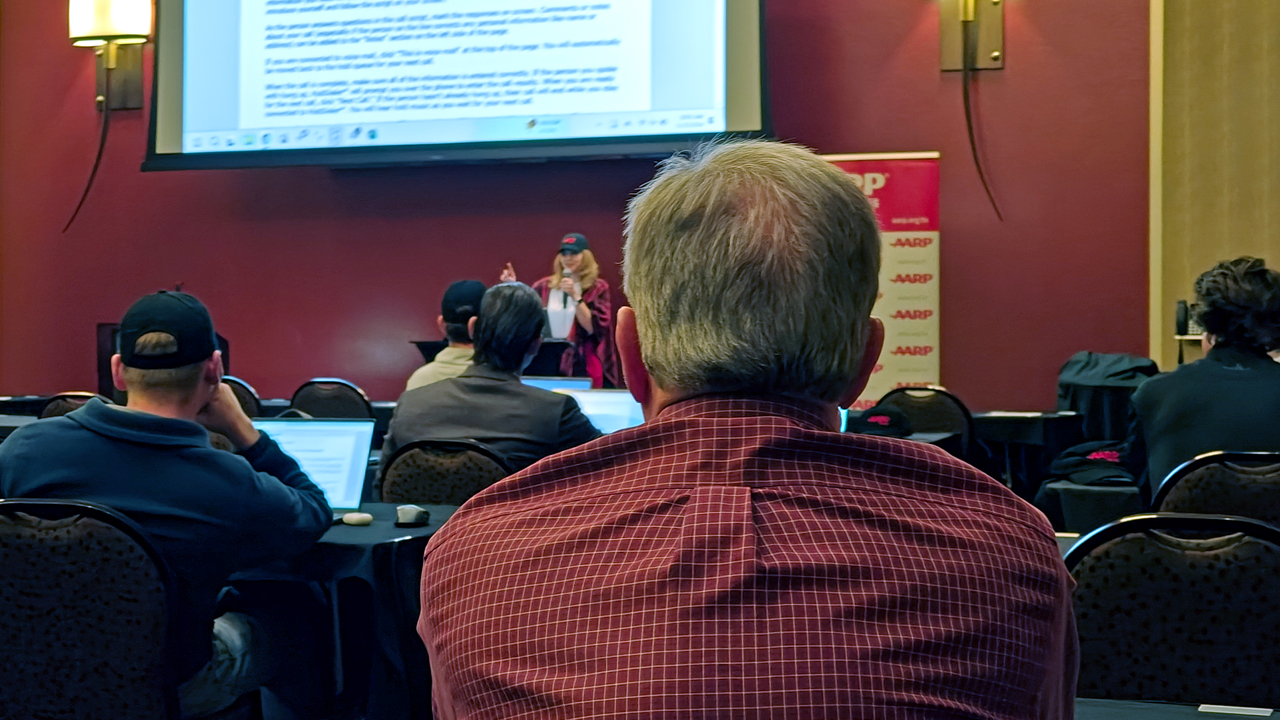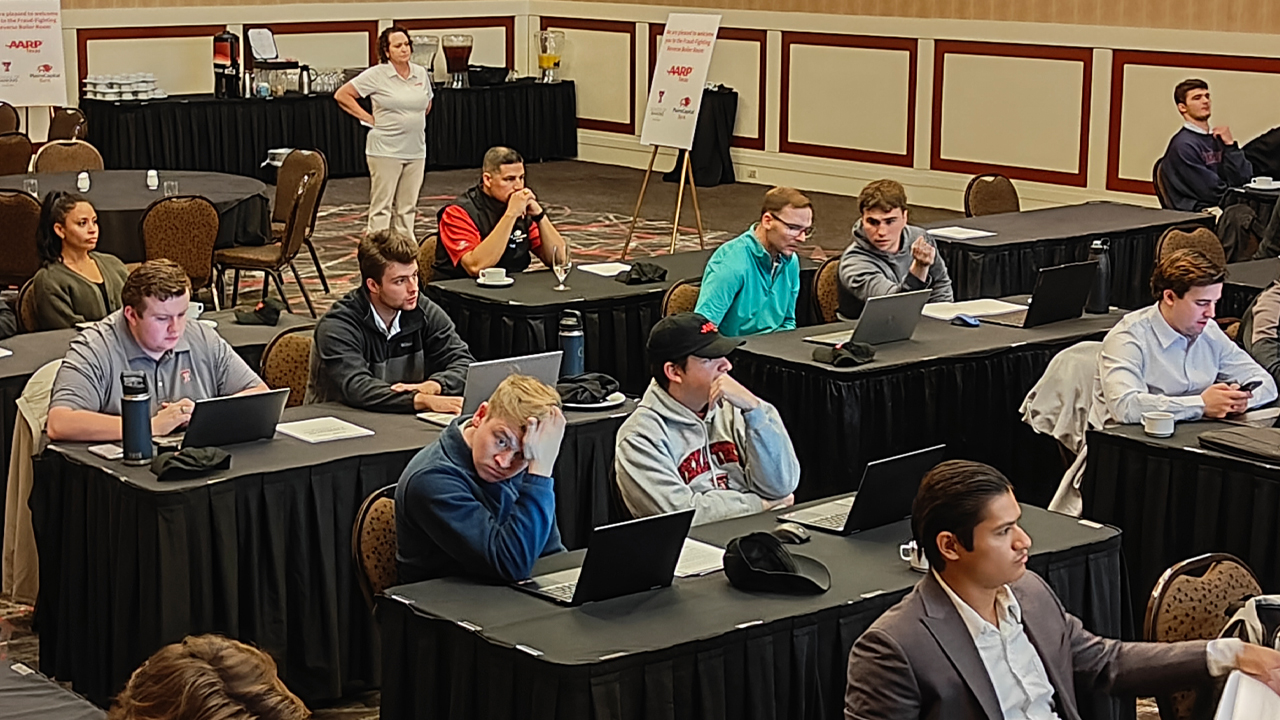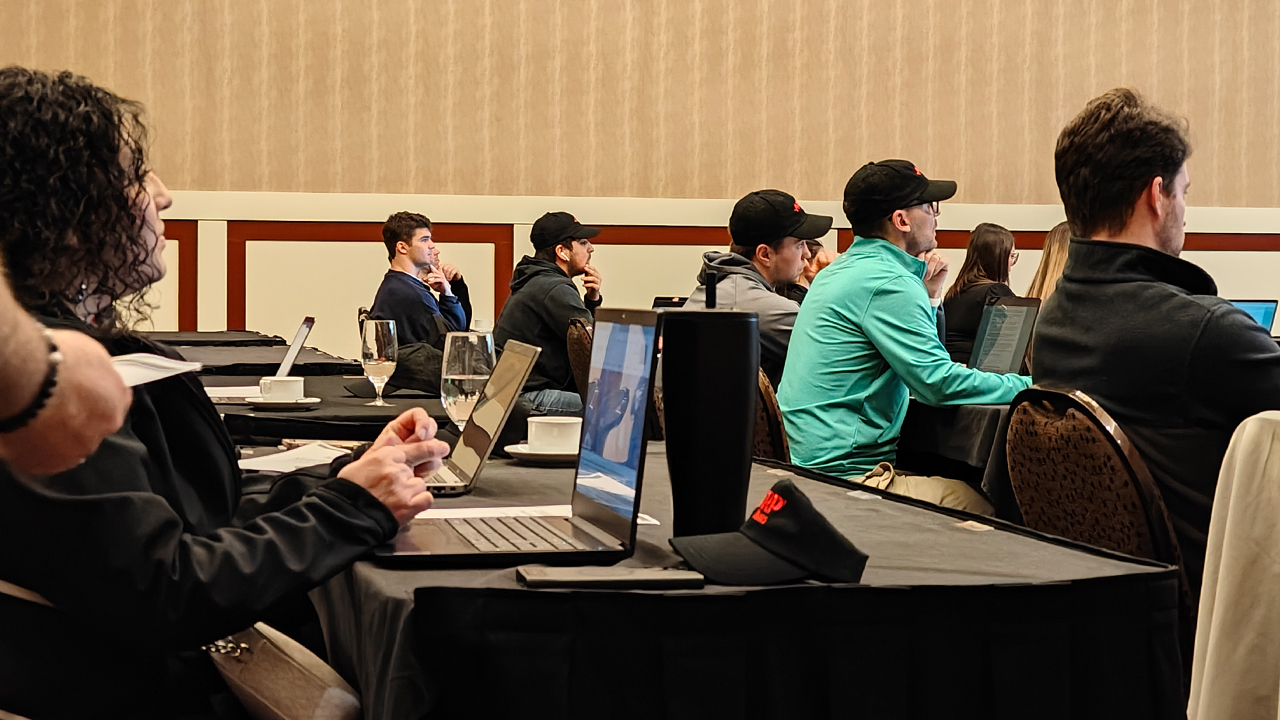An AARP reverse boiler room in the Overton Hotel & Conference Center to fight back against fraud and scam calls. Staff photo.
Thirty-five or so volunteers gathered Friday in the Overton Hotel & Conference Center for an anti-scam operation known as a “reverse boiler room.” It’s opposite a boiler room – named for the high-pressure tactics some phone scammers use to get money from their victims.
“Usually, it’s a dank room. … They’re kind of packed in there with phones,” said Seth Boffeli, senior advisor with American Association of Retired Persons’ national office.
Scammers don’t spend much on their call centers, Boffeli said of boiler rooms, giving the image of a hot, sweaty, crowded room.
“It’s not nice like this hotel conference room,” Boffeli said.
The AARP is fighting back – having organized student volunteers from the Texas Tech School of Banking. For five hours or more, they dialed out to Texans doing the opposite of the scammers.
Instead of pressuring people for money, they offered guidance on how to defeat the scammers.
This sort of thing has been done in other states, said Mark Hollis, communications manager for AARP in Texas.
“This is the first one that we’ve done in Texas ever,” Hollis said.
Volunteers reached more than 15,000 people with an original goal of 40,000.
The grandchild crash and other scams
“A lot of seniors get what we call the ‘grandparent scam’ – a phone call with a distressed voice claiming to be their grandson or daughter who was in an accident,” Boffeli said.
The goal is to scare someone and demand money quickly without thinking.
“A lot of times a victim will get a call saying, ‘This is the Social Security Administration. Your Social Security number was found in a car filled with drugs on the border and there’s going to be a warrant out for your arrest if you don’t send $1,000,’” Boffeli said.
He calls it the government imposter scam.

Joey Palamara, a Texas Tech graduate student, was among the volunteers. He’s never been successfully scammed, but his friend’s grandmother nearly was.
“My buddy’s grandma called him, and she was crying. She’s like, ‘You’re in the hospital Are you OK?’ And he was like, ‘I’m fine. I’m sitting on the couch right now,” Palamara said.
Palamara made several calls for AARP by the time he spoke with LubbockLights.com. He said most were receptive to his effort, but a few wanted to be removed from the call list.
That’s a good thing, Boffeli said. The people needing the information most are those who answer the phone.
“One of the most dangerous things you can do is answer the phone and talk to somebody that you don’t know. And so, we expect to get hung up a lot on today, which is a good thing,” Boffeli said.
Anastasiia Khrustaleva, a Texas Tech student volunteer originally from Moscow, Russia, said several people hung up on her. But that was okay.
“It’s good when people are careful about their phone calls,” Khrustaleva said.
All too common
Local statistics were not available on short notice, but the problem of phone scamming is not hard to spot here in Lubbock.
In the last year, the Lubbock Police Department shared multiple examples of someone posing as an LPD officer demanding cash to avoid arrest. In other cases, someone posed as a bank employee to verify an account password or a PIN.
They’re sophisticated – with scammers able to falsely project a bank’s phone number on caller ID.

In one recent example, a statement from the LPD’s Facebook page said someone called local businesses.
“An individual identifying themselves as an LPD officer is asking for an exact count of the money in the registers – and even going a step further to ask for the employee to meet them at a separate location with the cash to ensure the money is not counterfeit,” police said.
In a recent poll, “92 percent of Americans reported receiving spam calls. The numbers for spam texts are no less; 86 percent of Americans confirmed they received them.”
Not all of them fell victim, but among those who did, the poll indicated the average loss was $450.
The data came from the Harris Poll, acting on behalf of a spam-blocking software company called Truecaller, which did a survey in January of more than 2,000 adults.
The Federal Trade Commission (FTC) had a similar number for average losses.
“One in four people reported losing money to scams, with a median loss of $500 per person,” the FTC said in February.
Email was the most common form of contact. But phone scams are more devastating – raising the average per-person loss to $1,480, according to the FTC.
Younger Americans were scammed more often but older Americans suffered higher losses, the FTC said.
Boffeli said, “We are literally under attack all of us, day in and day out.”
Military style camps of scam callers
The scam callers are not always doing this on their own.
“There are so many stories in Asia right now of people being either conscripted or they apply for a job – and they move overseas and they get put in there. They’re military style camps where all they do all day for 12 hours a day is make phone calls or run e-mail campaigns, trying to entice people into either a romance scam or a government imposter scam,” Boffeli said.
The goal was, at least for a little while, to make Lubbock the exact opposite.
Hollis said AARP has a permanent presence in the bigger cities like Dallas or Houston.
“We don’t have permanent staff in Lubbock,” Hollis said.
So, it’s good to get out and do events in places like Lubbock or Tyler, he said.
Phone scams are just the start, Hollis said AARP is working on legislation to regulate other problems like cryptocurrency kiosks. People don’t know what they are, he said, and it can lead to problems.
For more information, Hollis said to visit aarp.org/money/scams-fraud/.
Please click here to support Lubbock Lights.
Comment, react or share on our Facebook post.


 Facebook
Facebook